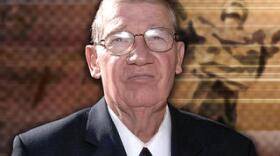With the Senate set to debate non-binding resolutions next week to protest President Bush's decision to send thousands more troops to Iraq, some senators want to go further. The Senate Judiciary Committee held a hearing Tuesday to ponder exactly how much power Congress has over the conduct of the Iraq war.
The hearing on Congress' war powers was chaired by a longtime opponent of the Iraq war, Wisconsin Democrat Russ Feingold. He thanked the five constitutional scholars who sat before the committee:
"We are here today to find out from them not what Congress should do, but what Congress can do," Feingold said.
"Since the president is adamant about pursuing his failed policies in Iraq," Feingold said, "Congress has the duty to stand up and use its power to stand up and stop him."
Feingold then announced that he will introduce legislation Wednesday that would prohibit funds from being used to keep most U.S. forces in Iraq six months from its passage.
Library of Congress constitutional expert Louis Fisher said that it's only in the past half century that the notion has caught on that a president can go to war on his own, since Congress has the constitutional authority to declare war.
Feingold pressed Fisher on the point, asking, "That seems to suggest that Congress has not just the right, but the responsibility to provide a check on the executive branch and use its power to fix the failed Iraq policy, doesn't it?"
"You're the ones to make sure that that public will is respected and carried out," Fisher said. "And the power is much more in Congress in protecting democratic system than it is on the president."
But other scholars were more skeptical of Congress' powers. University of Virginia law professor Robert Turner said Congress does indeed have powers to raise and support armies, but with limits.
"Decisions involving the conduct of war, including where to move troops, whether to reinforce troops, whether to move troops from one hill to another, are vested exclusively in the president," Turner said, "and when Congress tries to control this power either directly by statute or by conditions to appropriations, it becomes a lawbreaker, it violates the Constitution."
When it comes to the conduct of war, Turner declared, President Bush is the decider.
As Republican Orrin Hatch of Utah spoke in more deference to the president on the issue, he was interrupted by a woman in the audience as he warned against congressional action.
"My son is a U.S. Marine, he has done two tours in Iraq," the woman said. "He is now being recalled for a third tour."
The woman pleaded for the senators to bring the troops home so her son would not be sent for a third tour in Iraq. And at the end, Feingold declared his bill would do just that.
"This hearing has shown that this legislation is fully consistent with the Constitution of the United States," Feingold said. "Congress should enact it, and soon. The hearing is adjourned."
Feingold got a standing ovation from the decidedly anti-war audience.
Copyright 2022 NPR. To see more, visit https://www.npr.org. 9(MDAzMjM2NDYzMDEyMzc1Njk5NjAxNzY3OQ001))






